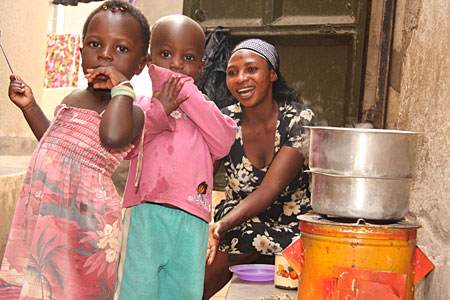Cutting greenhouse pollutants could directly save millions of lives worldwide

Tackling climate change by reducing carbon dioxide and other greenhouse emissions will have major direct health benefits in addition to reducing the risk of climate change, especially in low-income countries, according to a series of six papers appearing today (Wed., Nov. 25) in the British journal The Lancet.
Two University of California, Berkeley, authors of the papers — Kirk R. Smith, professor of global environmental health, and Michael Jerrett, associate professor of environmental health sciences — presented the results today at a press conference in Washington, D.C.
The press conference, held at the end of a half-day discussion of the studies' policy implications, also included Linda Birnbaum, director of the National Institute of Environmental Health Sciences (NIEHS) and National Toxicology Program. United Kingdom coauthors were patched in via satellite from London, where they participated in a simultaneous forum and press conference.
The studies, three of them coauthored by Smith and one coauthored by Jerrett, used case studies to demonstrate the co-benefits of tackling climate change in four sectors: electricity generation, household energy use, transportation, and food and agriculture.
"Policymakers need to know that if they exert their efforts in certain directions, they can obtain important public health benefits as well as climate benefits," said Smith, who was the principal investigator in the United States for the overall research effort. "Climate change threatens us all, but its impact will likely be greatest on the poorest communities in every country. Thus, it has been called the most regressive tax in human history. Carefully choosing how we reduce greenhouse gas emissions will have the added benefit of reducing global health inequities."
Each study in the series examines the health implications in both high- and low-income countries of actions designed to reduce the release of carbon dioxide (CO2) and other greenhouse gases. Climate change due to emission of greenhouse gases from fossil fuel energy sources causes air pollution by increasing ground-level ozone and concentrations of fine particulate matter.
The studies were commissioned by the NIEHS, part of the National Institutes of Health (NIH), in part to help inform discussions next month at the U.N. Framework Convention on Climate Change in Copenhagen. The NIEHS is one of the key sponsors of the international event.
"These papers demonstrate there are clear and substantive improvements for health if we choose the right mitigation strategies for reducing greenhouse gas emissions," said Birnbaum. "We now have real life examples of how we can save the environment, reduce air pollution and decrease related health effects; it's really a win-win situation for everyone."

A case study led by Smith on the health and climate benefits from a potential 150-million-stove program in India from 2010-2020 gives the largest co-benefit of any examined in the six papers. Smith has shown that providing low-emission stove technologies in poor countries that currently rely on solid fuel household stoves to cook and heat their homes is a very cost-effective climate change linkage. The 10-year program could prevent 2 million premature deaths in India, he said, in addition to reducing greenhouse pollution by hundreds of millions of tons.
The paper coauthored by Jerrett contains analysis of 18 years of data on the long-term health effects of black carbon - the first study of its kind ever conducted. The study followed 352,000 people in 66 U.S. cities and was conducted by a team of U.S. and Canadian researchers led by Jerrett and Smith. Black carbon is a short-lived greenhouse pollutant which, along with ozone, is responsible for a significant proportion of global warming. Unlike CO2, these short-lived greenhouse pollutants exert significant direct impacts on health. Also, because they are short-lived, emission controls are almost immediately reflected in changes in warming.
"Combustion-related air pollution is estimated to be responsible for nearly 2.5 million premature deaths annually around the world and also for a significant portion of greenhouse warming," said Smith. "These studies provide the kind of concrete information needed to choose actions that efficiently reduce this health burden as well as reduce the threat of climate change"
In a statement issued today to the media, Secretary of the U.S. Department of Health and Human Services Kathleen Sebelius thanked the international research team for bringing the world's attention to the co-benefits of tackling climate change.
“We are learning that the health of our planet and the health of our people are tied together. It’s difficult for one to thrive without the other," Sebelius said. “Climate change is not a problem that one country or one organization can solve on its own. It’s a problem that affects us all."
“If we work to reduce pollution," Sebelius added, "we will also reduce deaths from respiratory and cardiovascular diseases.”
Funding for The Lancet Health and Climate Change series was provided by the NIEHS and U.K. partners including The Academy of Medical Sciences, U.K. Department of Health, Economic and Social Research Council, London School of Hygiene and Tropical Medicine, National Institute for Health Research, Royal College of Physicians, and Wellcome Trust. The air pollution study also had funding from the Health Effects Institute, California Air Resources Board and Clean Air Task Force.
